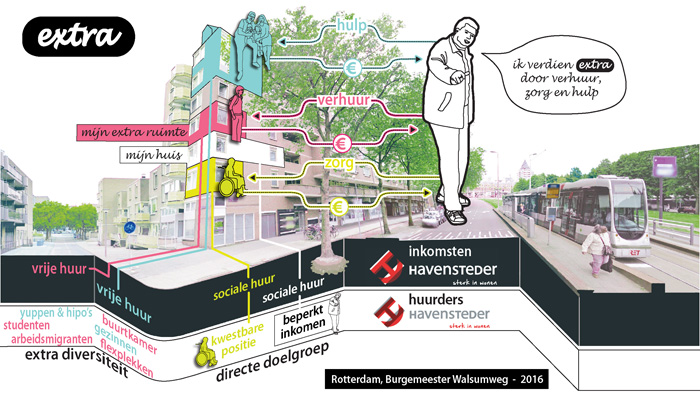Project Description
[:nl]Onze visie: Extra
Sociaal kwetsbaren en lagere inkomens zijn de doelgroep van Havensteder nu en in de toekomst. De doelgroep heeft het niet makkelijk: robotisering, WMO, automatisering, verdringing door hogeropgeleiden, bezuinigingen, etc raakt hun sociaaleconomische positie. EXTRA draait om het verbeteren van deze positie door te zorgen voor EXTRA inkomen voor lage inkomens en voor EXTRA zorg voor sociaal kwetsbaren. Bijkomend voordeel is een grotere diversiteit in de woonomgeving, hetzelfde geldt voor de betrokkenheid en de inkomsten voor Havensteder. Hoe?
1. Door EXTRA ruimte te verhuren aan een huurder met een laag inkomen. Deze huurder verhuurt deze extra ruimte en wordt dan een “hospita” voor studenten, een gastvrouw voor toeristen en arbeidsmigranten, een conciërge voor een flexplekken of beheerder van een buurtkamer. Dit genereert inkomsten, ruimte voor een nieuwe groep huurders en diversiteit in mensen en functies.
2. Door betaalde zorgtaken aan buren uit te besteden verdienen lage inkomens bij. Beter voor de portemonnee, maar ook voor betrokkenheid en sociale cohesie.
3. Door de doelgroep hulptaken van vrije sector huurders te laten uitvoeren. Even oppassen, schoonmaken of de was strijken, veel klusjes waarmee de doelgroep kan bijverdienen. De vrije sector huurders zorgen voor diversiteit in het gebouw en extra inkomsten voor de doelgroep en Havensteder.
De toekomst zit in ons en hoe wij met elkaar samenleven. Dit vraagt om een nieuwe visie op organisaties, wet- en regelgeving, de ruimtelijke indeling, inkomen en zorg (subsidies, belastingen, etc). De volgende fase van prijsvraag bestaat uit het opzetten van een lonend concept voor Rotterdammers en Havensteder.
——————————-
Helaas hebben wij niet gewonnen.
Our vision: Extra
Socially vulnerable and low income groups are the target of the social housing association Havensteder now and in the future. The target group is experiencing more and more difficulties: robotics, new policies for care, automation, displacement by highly educated, cuts, etc.; al these changes affect their socio-economic position. EXTRA offers solutions to gain extra income and EXTRA care for socially vulnerable. An additional benefit is greater diversity in the home environment, the same applies to the commitment and revenue for Havensteder. How?
1. By renting EXTRA space to a tenant with a low income. The tenant rents the extra space to third persons and is “landlady” for students, a hostess for tourists and migrant workers, a concierge for a flexible workplaces or manager of a neighbourhood room. This generates income, room for a new group of tenants and diversity in people and functions.
2. In the Netherlands health care is changing and this offers new opportunities for low incomes groups by offering care to their neighbours. This is better for their wallet, but also for engagement and social cohesion inside housing complexes and neighbourhoods.
3. Diversify rent and give space for higher income groups. The target group assists these new tenants in their daily tasks, such as cleaning or doing the laundry, taking care for their kids, etc. The private sector tenants bring diversity into the building and additional income for the target group and Havensteder.
The future is in us and how we live together. This requires a new vision of organizations, rules and regulations, physical layout, income and care (subsidies, taxes, etc). The next phase of competition consists of setting up a rewarding concept for both locals and Havensteder.
——————————-
Unfortunately we didn’t win.
para ver el video presione aquí
Texto acompañando nuestro proyecto: EXTRA
El grupo objetivo de Havensteder en la actualidad y en el futuro son habitantes con vulnerabilidad social o con bajos ingresos. Actualmente, la situación para este grupo no es fácil. Debido a robotización, automatización, disminución de los subsidios, recortes de presupuesto, este sector de la población está perdiendo su posición socio-económica. EXTRA trata de mejorar la posición de este grupo de personas a través de generar EXTRA ingresos para la gente de bajos ingresos y EXTRA cuidado/atención para las personas con vulnerabilidad social. Esta intervención genera beneficios adicionales pues la diversidad en el barrio se incrementa, asi como la participación de los habitantes y los ingresos de la corporación de vivienda. Como se logra?
1. Alquilando espacio EXTRA a arrendatarios con bajos ingresos. Este arrendatario puede alquilar este espacio extra volviéndose el casero de un estudiante, turista, trabajador temporal, o el administrador de un espacio flexible de trabajo, o de un salón comunal. De esta forma, la persona recibe extra ingreso, y al mismo tiempo se genera espacio para un nuevo grupo de arrendatarios, incrementándose así mismo la diversidad de habitantes y de usos del suelo.
2. Al delegar servicios pagos a habitantes con bajos ingresos, además de que se generan extra ingresos para los habitantes, se incrementa la cohesión social y la participación.
3. Al permitir que el grupo de bajos ingresos ofrezca servicios pagos a arrendatarios con altos ingresos.El cuidado de los niños, limpieza, cuidado del jardin, etc. son servicios que pueden generar EXTRA ingresos en el grupo objetivo de Havensteder. Además de genera ingresos para el grupo de gente focus, el tener arrendatarios con mas ingresos contribuye también a la diversidad de la población.
El futuro depende de la forma como colaboramos unos con otros. Esto requiere de una visión nueva para las organizaciones, las leyes,, la distribución espacial y los ingresos y el cuidado de la población.



![[:nl]Buurtaanpak Rivierenwijk en Transwijk[:]](https://www.urbanos.nl/wp-content/uploads/buurtaanpak-utrecht-vergroenen-500x383.jpg)
![[:nl]Plein om te ontmoeten voor de Zeeheldenbuurt[:]](https://www.urbanos.nl/wp-content/uploads/plattegrond-leiden-500x383.jpg)
![[:nl]Anders Werken[:]](https://www.urbanos.nl/wp-content/uploads/anderswerken-500x383.jpg)
![[:nl]Inclusieve Stad[:en]Inclusive City[:]](https://www.urbanos.nl/wp-content/uploads/URBANOS-inclusieve-stad-1-500x383.jpg)
![[:nl]Urban mining in de regio[:]](https://www.urbanos.nl/wp-content/uploads/URBANOS-spaanse-polder-3Dvoor-web-500x383.jpg)